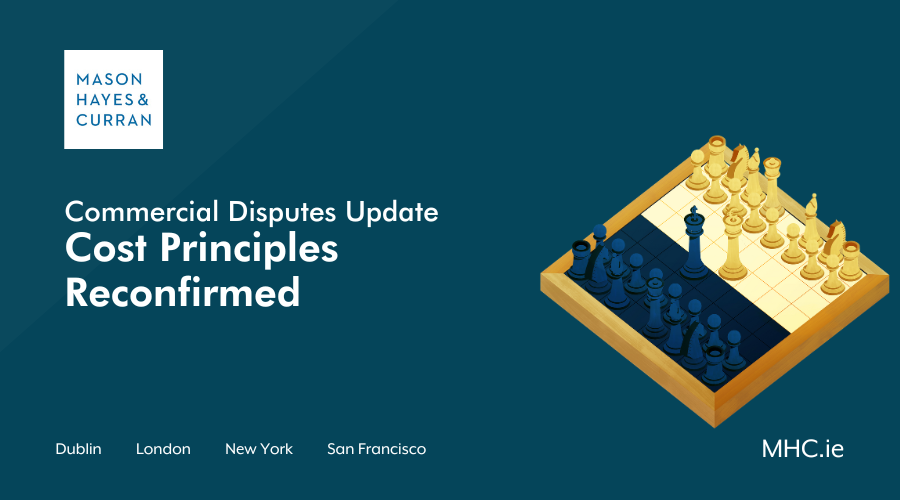Cost Principles Reconfirmed

A recent Court of Appeal decision has confirmed the common law and statutory principle that a party who succeeds in an action should be entitled to its costs. This was so in circumstances where the appellant requested a specific costs hearing despite an indicative adverse costs ruling by the Court of Appeal at the end of the substantive application. The indicative ruling was not changed where the appellant was found responsible for the relevant delays and where the costs submissions repeated contentions made as part of the substantive claim which were unsupported by evidence. Our Commercial Disputes team discusses the decision.
The essential principle that a party who succeeds entirely in their case should be entitled to their costs has been reconfirmed by a recent Court of Appeal decision.[1]
The Court of Appeal had already decided on the main issues in the case, ruling in favour of the respondents. This latest decision was regarding who should pay the legal costs regarding the appeal of that ruling. The respondents successfully argued that there had been an "inordinate and inexcusable" delay by the first appellant in pursuing its appeal. As a result, the appeal was dismissed. An indicative adverse costs ruling was given by the Court of Appeal when judgment was delivered. However, the appellant requested a specific costs hearing to make submissions as to why a different order should be made. In the subsequent and unanimous costs decision delivered by Mr Justice Edwards, consistent with the initial, indicative costs ruling, it was found that there was no reason to depart from the award of costs in favour of the respondents. It was “uncontroversial” that the respondents had been entirely successful in the appeal proceedings.
Background
The main issue determined by the Court of Appeal was that the first named appellant had caused an improper delay in progressing their appeal against the respondents, who were the defendants in the original High Court action.[2]
In delivering the ruling, the Court dismissed the appeal. The Court indicated that, because the respondents had succeeded in their application, they should be entitled to the costs. This entitlement would cover the expenses related to their motions to dismiss the proceedings on those grounds. However, it was indicated that if a party wanted a different costs order to be made, a separate costs hearing would be scheduled. Despite the indicative adverse costs ruling, the first named appellant did notify the Court of Appeal office of a desire to seek a different order. Written submissions were filed requesting either no order for the costs of the appeal or, alternatively, an order for the respondents to pay the costs. The arguments relied upon included claims that the Irish judiciary had not complied with their EU law obligations and had deviated from the Bangalore Principles of Judicial Conduct. Additionally, there were complaints about the impact of the prohibition on third party litigation funding and the rule in Battle.[3] Unsurprisingly, the respondents filed replying submissions maintaining that they were entitled to their costs given they were entirely successful. The costs hearing took place in May 2024 - without any legal representative attending on behalf of the first named appellant - and the costs ruling was delivered in August 2024.
Court of Appeal decision
The Court of Appeal outlined the relevant legal principles applicable to the award of costs. It noted that Order 99 of the Rules of the Superior Courts (RSC) gives the courts discretion to decide on the award of costs. However, it also requires them to consider the provisions of section 169(1) of the Legal Services Regulation Act 2015. Section 169(1) sets out the general principle that a party who is ‘entirely successful’ in proceedings is entitled to an award of costs against the party who is unsuccessful. However, the sub-section goes on to state that the Court may direct otherwise in light of the nature and circumstances of the case.
That statutory scheme applicable to the award of costs had been reduced to consideration of four questions in Higgins v Irish Aviation Authority.[4] The first question is whether a party has been ‘entirely successful’. Here, the Court of Appeal answered this in the affirmative. Mr Justice Edwards noted it was “uncontroversial” that the respondents had been ‘entirely successful’ in the appeal proceedings as that phrase is used in section 169(1).
The second question if so, is whether there is any reason having regard to the matters set out in section 169(1) that all of the costs should not be ordered in favour of the entirely successful party. Here, Mr Justice Edwards expressed the view that there was no reason why all of the costs should not be award to the respondents. Specifically, he stated that “no grounds had been demonstrated that would justify this court in departing from the default rule that where a party has been entirely successful they should receive their costs.”
There was no evidence that the respondents were responsible for any delays in the progression of the appeals. Additionally, they did not consent to, or accept, the delay caused by the first appellant. The reasons provided by the first appellant for the costs order were simply a repetition of previous complaints and arguments. As a result, the Court of Appeal, consistent with its earlier indicative costs ruling, decided that the respondents should be awarded their costs.
Conclusion
The decision represents a useful restatement of the principles applicable to the award of costs. It also highlights that a party which is found to be entirely successful can expect to be awarded its costs. More importantly, however, it is worth noting that had the first named appellant accepted the indicative costs decision they would have saved the additional costs of the costs hearing being awarded against it. In order to minimise their potential costs exposure, unsuccessful parties should therefore consider carefully if specific costs hearings should be sought following adverse indicative cost rulings.
If a party wants to challenge an indicative ruling on costs by requesting a specific hearing, they must present strong, fact-based arguments. It was accordingly not necessary to address any of the remaining questions identified in Higgins.
Merely making unsupported allegations will not be sufficient to persuade the Court to change its view.
For more information and expert advice on commercial disputes, contact a member of our Commercial Disputes team.
The content of this article is provided for information purposes only and does not constitute legal or other advice.
[1] Framus Ltd., Amantiss Enterprises Ltd (In Vol Liq) and Wilbury Ltd (In Vol Liq) v CRH plc, Irish Cement Ltd, Roadstone Provinces Ltd., Roadstone Dublin Ltd., Tradburn Ltd., Readymix plc, Kilsaran Concrete Products Ltd. & CPI Ltd. [2024] IECA 211
[2] The legal test applicable to the question of delay – as established by extensive case law – is whether it has been ‘inordinate and inexcusable’.
[3] The rule in Battle – derived from Battle v Irish Art Promotion Centre Ltd [1968] 1 I.R. 252 as affirmed more recently by the Supreme Court in Allied Irish Bank plc v Aqua Fresh Fish Ltd [2018] IESC 49 – is the principle that a company, as a body corporate, may only be represented by lawyers instructed on its behalf and not by its directors or shareholders.
[4] [2020] IECA 277
Share this:




